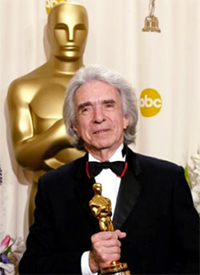 Arthur Hiller with his Jean Hersholt Huminatarian AwardOscar nominated Canadian born Hollywood director Arthur Hiller died yesterday at 92 years of age. Though he's best remembered for the 1970 mega-hit Love Story -- so popular in its day it would have been equivalent to a Jurassic World at the box office today (no really) -- his career was actually quite varied. He did dramas, romances, buddy comedies, period pieces, you name it.
Arthur Hiller with his Jean Hersholt Huminatarian AwardOscar nominated Canadian born Hollywood director Arthur Hiller died yesterday at 92 years of age. Though he's best remembered for the 1970 mega-hit Love Story -- so popular in its day it would have been equivalent to a Jurassic World at the box office today (no really) -- his career was actually quite varied. He did dramas, romances, buddy comedies, period pieces, you name it.
Among his best known films which is your favorite?
- The Americanization of Emily (1964)
- The Out of Towners (1970)
- Love Story (1970)
- Plaza Suite (1971)
- Man of La Mancha (1972)
- Silver Streak (1976)
- The In-Laws (1979)
- Making Love (1982)
- Author! Author! (1982)
- Outrageous Fortune (1987)
- See No Evil, Hear No Evil (1989)
Outrageous Fortune was probably my favorite of his films - Bette Midler & Shelley Long were so funny together -- but the film that's the most interesting, historically, is Making Love as it was the very first mainstream LGBT film...

I'm currently reading a book called "Gay Men at the Movies: Cinema, memory, and the history of the gay male community" and the film comes up often. The book is hard to describe but it's a study of movie theaters and other communal spaces in which the gay community viewed films and how context of where and when films played affects memories and perception. It's academic and a bit repetitive but quite interesting thus far. Here's a little bit on that film from the book:
The search for positive image was becoming increasingly complex. Was presenting gay men on-screen who were successful, upper middle-class and attractive a welcome countering of old stereoytpes or was it a a worrying attempt to enforce conformity? The Star's reviewer applauded the film for presenting more positive images of gay men but then suggestd, "Some might argue that they are a little too glowingly positive - not all gay men are upwardly mobile doctors and lawyers!" This highlights the burden of representation carred by gay male characters, particularly in terms of the perpetual search to define such characters as either positive or negative. The suggestion is that any gay character must be representative of all gay men, a burden not carried by white heterosexual - and particularly male - characers.
The positive/negative dichotomy could be given some nuance, howerver, by those happier to delineate between differing forms of identity and the differing subject positions from which gay men watched movies. Barry Lowe stated that as an "out" and politically aware gay man, he found the film "earnest" and boring. This was not, to Lowe, "a film of, or for, radicals"
Michael Ontkean and Harry Hamlin in "Making Love"
... If some gay men feared that Making Love reprented too conformist a form of male sexuality, it was viewed by some in the mainstream media as anything but. The film was swept up in a backlash against the appearance of gay characters on screen. Reviewers, particularly in the tabloid press, were at times framing their reviews of these films as complaints about the increasing visibility of gay characters. The Sun Herald complained, "The love that once dared not whisper its name, as someone remarked recently, has become the love that can't seem to keep its trap shut." The reviewer was prepared to give the filmmakers credit for taking on a "dodgy" issue , but announced, "Endless variation on the gay theme are heaing our way [...] For some of us, this is no singing matter."
We've come a long way... but also we haven't. We so rarely get mainstream LGBT movies even today.